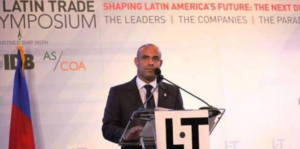By Mimi Whitefield
mwhitefield@MiamiHerald.com

Haitian Prime Minister Laurent Lamothe described his efforts to bring Haiti into the digital age Friday as he was saluted as Innovation Leader of the Year at the BRAVO Business Awards in Miami.
He also said the Haiti of today has “the most pro-business government in the past 50 years” and is undergoing a paradigm shift as it moves away from an era when former governments were “anti-business.”
“So come on down,” he invited some 400 business, social and government leaders from around the hemisphere who met at the JW Marriott Marquis for the 20th annual Latin Trade Symposium and BRAVO Business Awards. The events are presented by the Latin Trade Group.
“Many of you have engaged with Haiti and I thank you,” said Lamothe. “Those who haven’t, I invite you.”
The prime minister’s remarks drew a standing ovation at the symposium, “Shaping Latin America’s Future: The Next Decade of Decisions.”
Despite touting the Michel Martelly government’s pro-business credentials, The World Bank recently ranked Haiti 180th among 189 world economies as a place to do business. In the Americas, only Venezuela was ranked lower.
Haitian executives in the crowd also noted that although the Martelly government is well-intentioned, other Haitian governments have been pro-business. During the interim government of 2004-2006, for example, Haiti passed one of the most progressive investment codes in the region, offering a 15-year tax holiday to new investors.
Lamothe said he and his team, which included a delegation of 40 that accompanied him to Miami, were working tirelessly to turn the Haitian economy around after the massive 2010 earthquake.
When Martelly took office in May 2011, Lamothe said, 56 percent of Haitians were living in extreme poverty and 75 percent were unemployed.
“We want to empower people’s entrepreneurial side and bring the poor into the formal economy,” said Lamothe, who gave the keynote address at the symposium. “The only way of fighting poverty is with job creation and investment.”
Lamothe said the government is using innovation to try to bring more Haitians into the formal economy.
A surcharge on international money transfers and phone calls, he said, has raised $36 million to help pay for education. A program that provides money transfers to 122,000 mothers also is helping keep children in school, he said.
Haiti, however, continues to suffer from a shortage of schools and overcrowded classrooms.
Some colleagues have taken to calling Lamothe the “P.M. 2.0.” During widespread flooding in northern Haiti in recent days, Lamothe said ministers drew up task management plans on their iPads to handle the disaster, which has claimed 12 lives. “Very quickly we were able to organize and get set up,” he said.
Meanwhile, Lamothe said Haiti was starting to see an uptick in investment, more private involvement in the energy sector and has a new state-of-the-art industrial park.
“We have been working 20 hours a day for the past 2 1/2 years,” Lamothe said. “We are moving forward in the right direction.’’
Speakers on a panel examining the next decade of decisions Latin America will face, said the region is also generally moving in the right direction but leaders can’t become complacent.
Among the challenges ahead, they said, are improving education, increasing productivity and making the region a more inclusive place where growth is sustainable.
“Regional integration for me is a must but it must be flexible, intelligent integration,” said Enrique V. Iglesias, president of the ASTUR Foundation and former president of the Inter-American Development Bank.